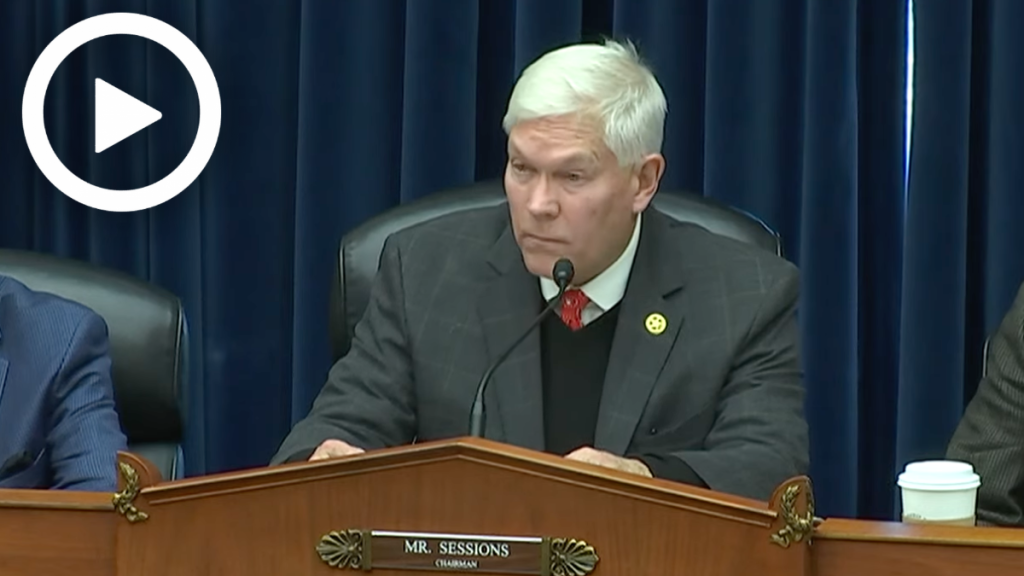Sessions: Lack of Transparency on Telework Raises Concerns that Federal Agencies are Falling Short in Service to American Taxpayers
WASHINGTON—Subcommittee on Government Operations and the Federal Workforce Chairman Pete Sessions (R-Texas) today delivered opening remarks at a hearing titled “Oversight of Federal Agencies’ Post-Pandemic Telework Policies, Part II.” Chairman Sessions reiterated the Subcommittee’s goal to ensure federal agencies are measuring the impact of telework on their ability to put American taxpayers and agency missions first. Telework remains at elevated levels even despite President Biden’s call for federal employees to return to the office in person.
Below are Subcommittee Chairman Sessions’ remarks as prepared for delivery.
Welcome, everyone, to today’s hearing of the House Oversight and Accountability Subcommittee on Government Operations and the Federal Workforce.
We gather for the second hearing around telework in Federal agencies.
The underlying question remains the same: are the telework policies in federal agencies putting mission accomplishment—and the American taxpayer—first?
In our first hearing, we had the opportunity to hear from four agencies regarding their approach to telework and its impact on agency missions.
Those agencies were selected because their responses to our committee inquiries seeking real data about telework appeared to reflect a good-faith effort to answer our questions.
This hearing, however, takes us to the other end of the spectrum.
I want to be clear, of the 25 agencies we wrote last spring, many responses were not, in fact, responsive.
11 of the 25 did not include any figures at all regarding how many of their employees were currently teleworking—either in the Washington, D.C. area or agency-wide.
This lack of transparency—or lack of basic knowledge the Administration has about federal telework—raises concerns that every member on both sides of the aisle should share.
It is our job to conduct oversight of the executive branch on behalf of the American people.
And our requests were reasonable: they were not “gotcha” type requests.
Bear in mind, all of these agencies are supposedly putting together plans geared towards “improving organizational health and organizational performance.”
And the impact of telework—for good or bad—is supposed to be part of these plans.
That OMB guidance further states agencies should develop a set of “validated indicators that can be routinely measured, tracked, and assessed, with which an organization’s senior leadership, managers, front-line supervisors, workforce, and stakeholders can monitor the organization’s effectiveness and ability (including resilience, capability, and capacity) to perform and adapt.”
And finally, according to the timeline set out in the guidance, activities around these plans should be well underway.
So, it is difficult for me to understand why so many of the responses we received look like nothing more than “phoning it in.”
Either these agencies simply do not know the answers to some, or all, of the questions we asked, or they do not want to share it.
In its guidance, OMB called for an increase in meaningful, in-person work.
In our first hearing, we discussed the negative impact telework and remote could have on new workers and younger workers.
So, it was curious that four months after this guidance was issued, the White House chief of staff would need to send an E-mail stressing the need to increase in-person work.
The obvious answer would be that he sent that E-mail because agencies were not doing what OMB had already directed them to do.
Along with Chairman Comer and Congresswoman Boebert, I sent a letter to Mr. Zients asking a number of questions related to this E-mail.
On September 19, we received a response, but not answers to our questions.
Then yesterday, a Wall Street Journal Story – in which an administration spokesman admitted only two agencies had reached their goals in adopting and enforcing new workplace requirements – confirmed our suspicions.
In our first hearing, we heard that agencies are trying to figure out the right mix of telework and in-person work.
But the President himself is telling federal employees to get back in the office, and they aren’t coming back.
Perhaps now Mr. Biden is more sympathetic to the concerns Mr. Trump raised about federal workers following the policies of the chief executive.
Today is another step in understanding the federal telework situation – but I cannot say I am confident the Biden Administration has a handle on it – or control over it.
And with that, I yield to the distinguished ranking member of the subcommittee, Mr. Mfume.
